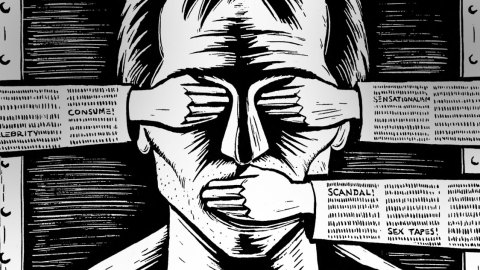Reporters Without Borders recently declared Syria as the “most dangerous country for journalists in the world.” This, along with the latest high profile cases of abducted Spanish journalists Javier Espinosa and Ricardo Garcia Vilanova, and renowned Syrian activist Razan Zaitouneh, served as a wakeup call for Syrian journalists and media activists. They have already paid a hefty price, in detention, torture and murder, for their work reporting the crimes of the Syrian regime, only to find themselves faced with the same threats from groups filling vacuum in liberated areas such as the Islamic State of Iraq and Syria (ISIS).
Activists and journalists may have accommodated in the beginning some of these practices, and restrictions on their work, as a natural outcome of the chaos on the ground and the immaturity of some of the revolution’s factions. However, as more and more militias publically claim allegiance to the al-Qaeda’s fundamentalist ideology and declare outright hostility against journalists and reporters, the fear of a new tyranny has become more real than ever.
This hostility has recently taken shape in the prolonged detention of nonviolent activists and media professionals like Samar Saleh, Mohammad al-Omar, Mohammad Nour Matar, Father Paolo Dall´Oggio , Abu Maryam, among many others. Further escalations against journalist came when ISIS took over the offices of Radio ANA in Raqqa on October 1, 2013, confiscated the radio’s equipment, and abducted staff member Rami al-Razzouk, which led to the shutdown of the radio station.
The murder of Iraqi journalist Yasser Faisal al-Joumaili on December 4 has further enraged media activists. Faisal was eulogized by journalist Diana Moukalled who worked with him in Iraq: “Yasser was always anxious about the situation in Iraq, but his warm smile never left his face. Our countries are killing its most beautiful people, and that’s a terrible curse.”

This situation has pushed several media organizations, independent media professionals and activists to launch a new initiative: “Put an end to crimes and violations against journalists and media professionals in Syria.”
The initiative aims to draw attention to these crimes and raise a vocal opposition towards it. Its founding statement said: “The Islamic State of Syria and Iraq actively targets independent Syrian journalist cadres. They terrorize the free voices, constantly obstructing their work and even going as far as kidnap, detention and clandestine elimination. We consider this a clear strategy aiming at eliminating the revolutionary press, silencing free expression and bringing more censorship and oppression on the Syrian people. Hence we, the undersigned, declare our rejection to any form of intimidation against journalists, citizen journalists, media activists or media organizations under any pretext and from any party or faction.”
The statement also called on all Syrian and international civil society organizations, and international media associations and groups to “take the necessary steps to expose these practices, register their condemnation and to actively protect independent media professionals from these dangers.” Additionally, the statement demanded “the immediate release of abducted journalists and detained citizen journalists held in the jails of the Syrian regime or any other militant group operating on Syrian territory.”
The initiative also invited other international media organizations and organizations concerned with press freedom to join and take the necessary steps towards greater safety for journalists and their freedom of expression.
Several media organizations currently participate in the initiative including among others: Syrian Center for Media and Freedom of Expression, Syrian Journalists Association, Sham Center for Democracy and Human Rights Studies in Syria, Damascus Center for Human Rights Studies, Syrian Nonviolence Movement and Days of Freedom Initiative, as well as our own project Syria Untold. The initiative was also signed by a number of independent Syrian intellectuals, politicians and activists including: Burhan Ghalioun, Subhi Hadidi, Suheir al-Atassi, Rasha Omran, Ibrahim al-Jabin.
The movement comes as the first initiative to unite Syrian media organizations and associations in calling for an end to violations and crimes against journalists. It comes at a critical moment when more and more media professionals are paying the ultimate price for venturing to tell an uncomfortable truth for both the Syrian regime, and groups like ISIS trying to impose their own agenda on the population.



